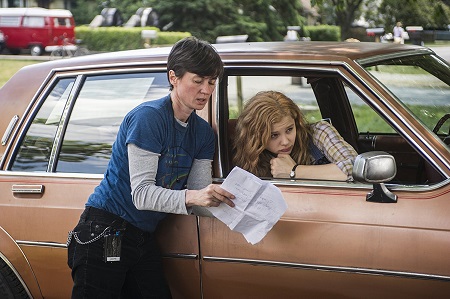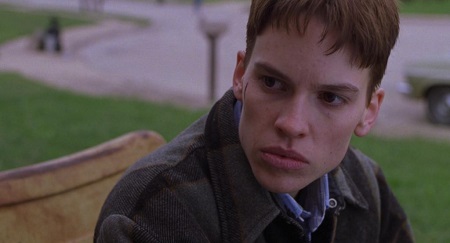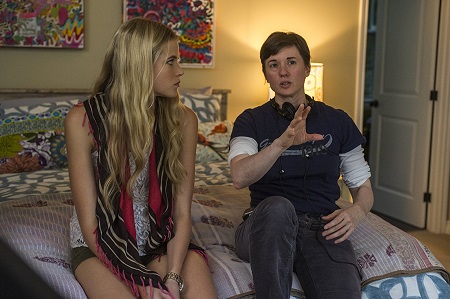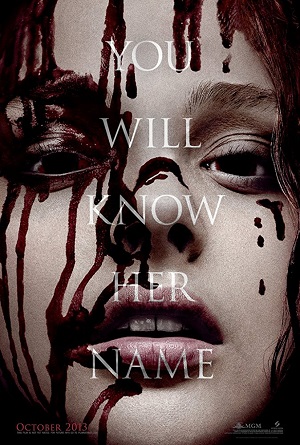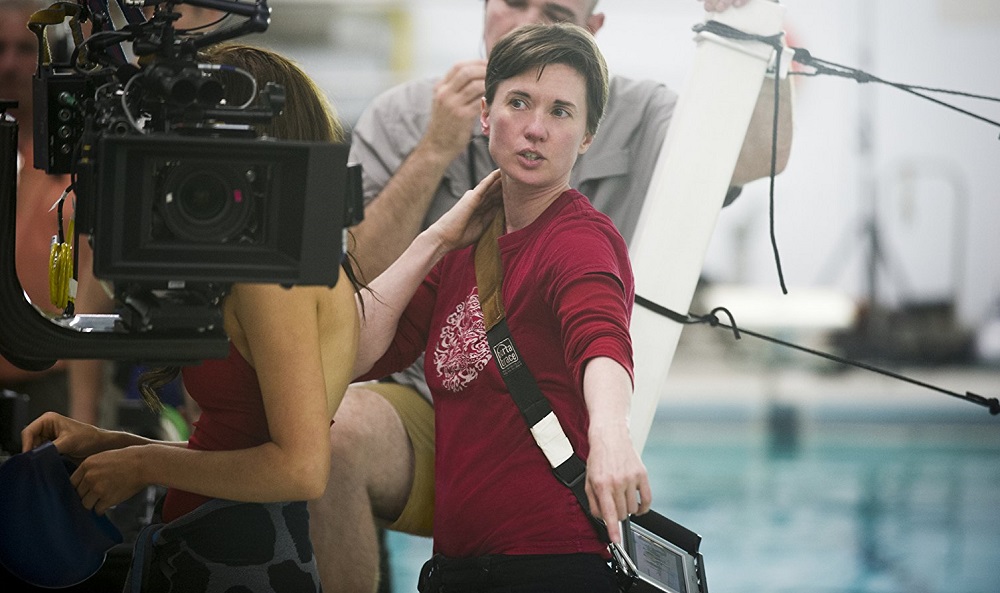
“Carrie” – Interview with Kimberly Peirce
by Sara Michelle Fetters - October 18th, 2013 - Interviews
Power to the Misfit
Director Kimberly Peirce Brings Carrie Back to Life
Boys Don’t Cry and Stop-Loss director Kimberly Peirce makes her return to multiplexes with the release of her version of Stephen King’s classic horror tale of alienation and adolescence Carrie. Starring Chloë Grace Moretz as the telekinetic title character and four-time Academy Award nominee Julianne Moore as her reserved, religious fundamentalist mother Margaret White, the movie attempts to bring the tale into the modern world, emphasizing the bullying aspects in ways Briand De Palma’s classic 1976 effort never could.
On a recent trip to Seattle I had the opportunity to sit down with the celebrated filmmaker to talk about the film. Here are some of the highlights from that conversation:
Sara Michelle Fetters: It’s probably the single question you’re most tired of answering but I have to ask anyway. Why Carrie? What is it about this story that captivated you?
Kimberly Peirce: First of all, Stephen King, he’s such a great writer. The story is amazing. Classic. Timely. Maybe more relevant now than it ever was before. I would also say, as with all my work but also what I love about movies and literature, it has an amazing central protagonist. She’s a misfit, an outcast, someone who has a hard time fitting in but wants love and acceptance like we all [do]. We can all relate to her.
Oh. And I forgot. She has superpowers. And the superpowers are great because they’re kind of like a talent, because even if you’re a misfit, if you’ve got a great talent you can kind of say, “Screw society, I’ll make the most of it in the world on my own.” But this is coupled by a Cinderella story because, at the end of the day, Carrie does want to venture out. She wants to be loved. She wants to dance with the handsome boy. She wants to wear the beautiful dress. She wants to have it all and we want that for her because you fall in love with her. We want to see her succeed.
I have this sneaky suspicion you also want to see it all go to Hell. I’m going to say we love the highpoint of the Cinderella story but we also love to see it all turned on its head. I think we are engaged by destruction and I think the fact we love a revenge tale, as human beings this fascinates me. That’s why Stephen King. That’s why Carrie.
Sara Michelle Fetters: The bullying aspect of the story has become such a central topic of our time. I like how we really get to see how bullying affects these kids, all of it in the context of this supernatural coming of age revenge tale.
Kimberly Peirce: The central story itself is as classic as Shakespeare, is as classic as a fairy tale. That Cinderella story turned on its head is timeless and it is amazing. So we start with that structure. But what is undeniable is that, over the last 40 years our world has technologically revolutionized. If we’re enjoying something I’m going to film it because that’s just what we do and we now have the resources at our disposal to instantly do just that. If it gets filmed, it’s probably going to get uploaded. If it gets uploaded, it’s going to be shared. That means tons more people are going to have access to this video than you or I ever intended. It could hurt people. It could help people. It is going to spread. The effect this video is going to have is ultimately out of our control.
That’s extraordinary. For me, the challenge here was taking what King wrote about and making it utterly real and utterly modern for today’s world. Social media is sort of my Atomic Bomb in the movie. Carrie has her moment in the shower and what is Chris doing? She’s filming. We know that this video is going to get out. We know the power it is going to have to destroy. And, realistically, I think we all know this is going to climax at the Prom.
Sara Michelle Fetters: You are in some ways beholden to the genre aspects of the tale. How hard is it to balance the horror aspects with this intimate story of a little girl lost just trying to fit in?
Kimberly Peirce: It’s a great question, and the great thing about King is that this balance is inherent in the DNA of the novel. You both love Carrie but, he’s a horror writer, which means he writes horror, so you know things are going to go bad at some point. I was never at odds with the material, I was in synch with it, so the question was how do I get what works so well on the page to also work on the screen?
One answer is that it’s imperative to hire the right actress to play Carrie White. That was a big deal. We looked at hundreds of girls. Chloë Grace Moretz was right because you fall in love with her. You want to adopt her. Everyone I spoke to told me I was going to fall in love with her and I was like, no, not going to happen, I’m just going to work with her like any other actress. But by the end of the shoot I wanted to take her home with me. She’s wildly charismatic. The camera loves her. She’s an incredible actress.
Sara Michelle Fetters: What was it like to work with her?
Kimberly Peirce: I got to take her on this amazing journey. She’s super confident, very poised beyond her years, comes from a loving family and knows her craft really well. We took that all away from her. We started with the young woman who is full of talent and moved her into the skin of this fragile girl who was an outsider and a misfit. It was the best of both worlds. Chloë was still this gifted, talented, confident actress but without her support system surrounding her she more easily became Carrie White, a fragile outsider with untapped superpowers longing to fit in.
So you ask how I keep the humanity up and the horror up? She’s piece one of the humanity because we love her. It was evident to me right away that Carrie was not about identifying with anyone other than her. It’s the story of the misfit. We’re all misfits, so when the horror aspect takes hold Chloë is equally amazing there as well. She becomes the human monster, moving in reptilian ways while having an incredible relationship with the camera that constantly amazed us. She’s my human monster, and once I knew I loved this girl I knew I could balance all the aspects of the tale in a way hopefully audiences would respond to.
Sara Michelle Fetters: Than you add Julianne Moore to the mix.
Kimberly Peirce: She’s one of our greatest living actresses. We love Julianne. She is infectious. You know she is going to make Margaret White, a character that in lesser hands could be kind of inhuman, wildly human. What she’s doing to Carrie is monstrous but at the same time she’s human, so in many ways Margaret is another human monster. They love each other. They’re feuding. They’re ultimately at one another’s throats. Julianne makes all of this believable in a way that makes the horror aspects even more shocking. She’s incredible.
Sara Michelle Fetters: The mirror aspect to all of this can be potent, so I imagine focusing on the duality of each situation was important.
Kimberly Peirce: It was. Everything had a duality. Every scene started one way and then it changed. When Chloë is in the shower the warm water is soothing her, but than her period comes and she’s horrified. She reaches out to the girls for help and it initially looks promising. They ultimately terrorize her. She’s at the Prom in this beautiful dress and looks fantastic, we empathize with her and our happy for her success. The blood comes down and the terror begins. Every scene feeds back to King’s book, going from positive to a kind of horror. Maintaining that balance and emphasizing those aspects was incredibly important.
Sara Michelle Fetters: Was there ever any moment on your part, or on the parts of either Julianne or Chloë’s, where any of you felt the pressure of stepping into shoes as big as the ones Brian De Palma, Sissy Spacek and Piper Laurie filled back in 1976?
Kimberly Peirce: I would say that what Sissy and Piper did was absolutely perfect, so, yes, we were all aware that these people made a fantastic, wonderful film. We were also aware that the source material was fantastic and that we were going at this from a perspective set 40 years later. For me, in particular, there were things that were important for me to accomplish. I wanted to make sure and bring Chloë inside Carrie White as she is 15 and is going though many of the same things the character is. Let me bring Julianne into this film, who is brilliant, and have her define a Margaret White that is appropriate and emblematic of this era.
Simply by approaching the King material from a modern perspective you know it is going to be different. It’s why I do believe you can do Shakespeare over and over. It’s why Cinderella can be retold. It’s why Grimm’s Fairy Tales are so timeless. It’s why I enjoy reading Oedipus over and over. De Palma’s version was great and it is great but that doesn’t mean there’s not space for two hopefully equally great adaptations of a fantastic story.
Sara Michelle Fetters: There’s a lot of restraint in regards to the Prom sequence. Did you feel as if you should up the splatter quotient? To push the boundaries of that R-rating and let the blood and gore flow freely?
Kimberly Peirce: I always knew my aim was to keep the focus on Carrie. In general, I think with sex and violence you don’t want to go into pornography unless your aim is to make pornography. If you’re going to make pornography, do it and do it great. I love pornography. I love very violent films. I love it all. But my focus as a director is to always make sure I am servicing the story and not allowing things to devolve into pornography. Now, I can only discover that line by trying different things and pushing boundaries. There are takes with the blood where there’s a hell of a lot more of it just as there are scenes with the action where the carnage is far more pronounced.
But I always do this with my movies. I push things past the point that it services the story because I don’t always know what will service the story. So I push it to a level of pornography, not because I want to end up there, but because I want to go too far so I can say this or that doesn’t work and we can pull it back. At the same time, I’ll also discover moments where I thought I’d gone too far but actually discover something magical. I’m a big fan of get it perfect; now go farther. Is there anything else the actors want to try? Is there anything else I want to try? I’d rather have too much in the editing room than not enough. I’d rather have “Take Four” be wrong and know why it is than have “Take Two” be apparently perfect but no other takes of merit to judge it against.
Sara Michelle Fetters: I know it’s off-topic but I want to bring it up quickly if I can. Stop-Loss, your second film, were you at all surprised by the relatively tough critically reaction at the time? And are you surprised by the reassessment that seems to have happened?
Kimberly Peirce: I’m humbled. The thing is, if you’re going to be a director you got to have a thick skin. The truth of the matter is that you’re the guy out there on the vaudeville stage doing the song and dance. If the audience likes it, you’re lucky, and if they throw bananas at you than you just have to give a better performance the next time out. You have to take things as they come. But the fact there is a reassessment? I’m humbled and I’m happy. All I want to do is please my audience and, with that film and with Boys Don’t Cry, I feel like the responses I got from those who watched them led me to believe I had.
Sara Michelle Fetters: Is it in some ways a no-win situation? Boys Don’t Cry was such a sensation, got those Oscar nominations, won Hilary Swank the Academy Award. Doesn’t that make it harder now to be treated fairly as a director when you have that sort of success right out of the gate?
Kimberly Peirce: You have to take the wider perspective. You have to say how damn lucky was I that I was able to have that sort of success with Boys Don’t Cry. I was in grad school. I fell in love with the story. I didn’t care about commerciality. The story was as queer as queer could get. I was living in the East Village with my buddies and we were all exploring our sexuality when Brandon’s story slapped us right in the face.
Thank god I didn’t care about anything else but character and story. I loved this kid, Brandon Teena. I went to the murder trial. It was my heart and soul. It was all I cared about. My friends were getting smaller opportunities in the business because I was so obsessed with this thing, with this story. I just struck true to my passion. It was my great fortune that it worked out. It was a miracle that movie got made. Thank god for [producer] Christine Vachon. We stayed on that road. We fought the good fight. We made the movie we wanted to make. Hilary won the Oscar. The rest is history.
I had a lot of fears. I was amazed. I was worried we were going to release the film in Middle America and it might encourage homophobia. I was worried and knew we had to get it right. But the queer community embraced it, which was never a guarantee. Lesbians want to claim Brandon. Transsexuals want to claim Brandon. Everyone wants to claim him as their own. But my goal and my statement was always to let this person be who they are as an individual, nothing more, and everyone seemed to respond and embrace that. At the end of the day, Boys Don’t Cry will forever be one of the great joys of my life and I’ll be grateful for that, so if critics and audiences are a little harder on me because I made that film I can take it because, seriously, look what I got? That was a dream come true. I love that movie, so if you give me a hard time on Carrie because of your feelings for Boys maybe you’ll give it back to me on the next one. I have to remember that.
Sara Michelle Fetters: You are obviously drawn to tales of people going through transformation.
Kimberly Peirce: Of course. They’re good stories. You can relate to them. I love their oddness and their difference; I love the idiosyncrasies that make them who they are. I just love them. There’s no desire to look at them in the typical or expected way. I’m interested in the conventional people in so far as they tell Carrie’s or Brandon’s stories. But the conventional people are not the right ones to tell their stories. I love the misfit. I love the outcast. The misfit represents all of us, and I think we’re lying to ourselves if we act like we have graduated from being in that position ourselves. I think people want to think they are no longer the misfit but the truth is everybody, everyday has some instant where suddenly you’re the odd one out.
I guess I’m just willing to admit that. And as I love the oddball and the misfit I am fortunate to be in a position where I can hold onto my own gender identity and not have to make a big deal out of that fact. How fortunate am I that I get to do the career I do, that I get to be completely honest in my gender presentation – and I want everyone to be honest in their gender presentation – and that I get to tell stories that mean something to me personally?
Sara Michelle Fetters: At the end of the day, what do you want audiences to take away from your version of Carrie?
Kimberly Peirce: I want them to fall in love with her in the same way I wanted them to fall madly in love with Brandon Teena. I want them to go all the way down the well with her. I want them to fall in love with this mother-daughter story and identify with a girl who isn’t as far removed from them and who they are as they might initially believe. And, yes, I want them to have a delicious time with the revenge tale. When I say to people, “Isn’t it a blast to want revenge,” everybody smiles that hesitant guilty smile and tries to look away. I just say go with it.
– Interview reprinted courtesy of the SGN in Seattle
